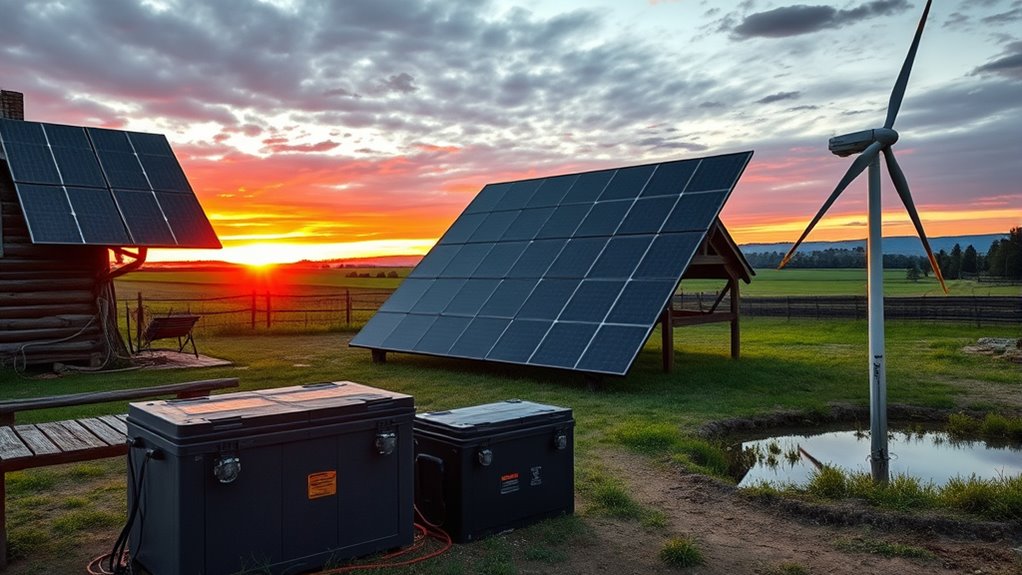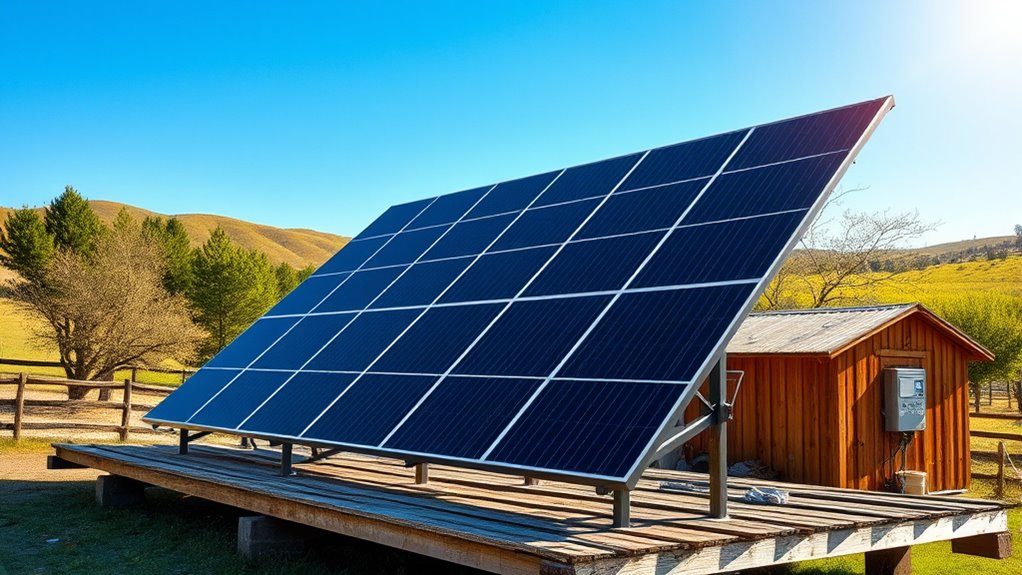Off-grid solar power lets you generate your own electricity using solar panels, storing excess energy in batteries for cloudy days or nights. You’ll need to regularly clean and maintain your panels, trim shading trees, and monitor your system’s performance with controllers and apps. Choosing the right batteries and backup options like a generator can boost reliability. Staying on top of maintenance guarantees your system provides steady power for your homestead’s essentials—continue exploring to learn more about making it work best for you.
Key Takeaways
- Harness sunlight with solar panels and store excess energy in batteries for continuous off-grid power.
- Regularly clean and trim panels to prevent shading and maintain optimal efficiency.
- Choose appropriate battery types like lithium-ion or flooded lead-acid based on energy needs.
- Use charge controllers and monitoring tools to ensure system reliability and detect issues early.
- Incorporate backup power sources and tailor system components to meet specific homestead energy demands.

Have you ever considered how you can generate electricity in remote areas without relying on the traditional power grid? Off-grid solar power makes this possible, especially if you’re a homesteader looking to become more self-sufficient. The core idea is harnessing sunlight with solar panels to produce electricity, then storing that energy for use when the sun isn’t shining. To guarantee your system operates smoothly, you’ll need to focus on solar panel maintenance and efficient battery storage solutions. Regularly inspecting your panels for dirt, debris, or shading is essential, as even minor obstructions can greatly reduce energy production. Cleaning the panels with water and a soft brush keeps them operating at peak efficiency, while trimming nearby trees or relocating panels avoids shading issues altogether. These simple maintenance steps help prolong the lifespan of your solar equipment and maximize your energy output.
Battery storage solutions are another indispensable component of off-grid solar systems. Since sunlight isn’t available 24/7, batteries store excess energy generated during sunny periods so you can use it during cloudy days or at night. Selecting the right batteries depends on your energy needs and budget, but deep-cycle batteries like lithium-ion or flooded lead-acid types are common choices among homesteaders. Properly maintaining your batteries involves keeping them at the recommended charge levels, avoiding overdischarging, and periodically checking for corrosion or leaks. Well-maintained batteries guarantee your system remains reliable and can supply power consistently, whether you’re running a water pump, refrigerator, or lighting. Additionally, incorporating renewable energy storage options like solar batteries can further enhance your system’s efficiency and sustainability.
Integrating your solar panels with effective battery storage solutions means you’ll have a dependable power source that reduces your reliance on external electricity providers. It’s wise to monitor your system’s performance regularly using a solar charge controller or a monitoring app, which can alert you to potential issues like low voltage or faulty connections. Additionally, investing in backup power options, such as a small generator, can provide peace of mind during prolonged cloudy spells or equipment failures. Remember, the key to a successful off-grid solar setup is proactive maintenance and choosing the right components tailored to your energy demands. With careful attention, your solar system can serve your homestead reliably, helping you live sustainably and independently in even the most remote locations.
Frequently Asked Questions
How Much Does Off-Grid Solar Power Typically Cost to Install?
You’re wondering about the cost estimation for off-grid solar power installation. Typically, installation expenses can range from $10,000 to $30,000, depending on your energy needs, system size, and location. Factors like equipment quality and labor influence the overall cost. To get an accurate estimate, consider consulting a professional for a detailed assessment, helping you plan your budget effectively and ensuring your off-grid setup meets your homesteading needs.
Can Off-Grid Solar Systems Power High-Energy Appliances?
You can power high-energy appliances with off-grid solar systems if you focus on energy storage and power scaling. By increasing your battery capacity, you store enough energy for heavy use, and by scaling your solar array, you generate sufficient power to meet demand. Proper planning guarantees your system handles appliances like refrigerators or power tools, giving you reliable, off-grid independence and the ability to run high-energy devices efficiently.
What Maintenance Is Required for Off-Grid Solar Setups?
You need to regularly maintain your off-grid solar setup by cleaning the panels to maximize efficiency, as dirt diminishes their output. Keep an eye on your batteries’ lifespan, since aging batteries may need replacement sooner. Check connections and wiring for corrosion or damage, and ensure your inverter functions properly. Regular maintenance helps your system stay reliable, efficient, and prolongs the lifespan of your batteries and overall setup.
How Do Batteries Impact Overall System Efficiency?
Batteries greatly impact your system’s efficiency through their charge efficiency and lifespan. When batteries have a high charge efficiency, you get more usable energy from each charge cycle, reducing waste. A longer battery lifespan means fewer replacements, saving you money and effort. Proper maintenance and choosing quality batteries ensure your system stays efficient, making sure you maximize your solar power output while extending the overall lifespan of your setup.
Is Off-Grid Solar Suitable for Cold or Cloudy Climates?
Think of off-grid solar as a resilient bird soaring through varied skies. In cold or cloudy climates, solar panel efficiency can dip, but it doesn’t mean you’re out of luck. Modern panels are designed to handle climate considerations, capturing diffused sunlight even on cloudy days. With proper system sizing and energy storage, off-grid solar can still meet your needs, proving its worth as a dependable power source regardless of weather conditions.
Conclusion
Harnessing off-grid solar power is like finding your own sunlit oasis amid the desert of dependency. Just as the pioneers once charted unknown territories, you’re forging a path toward independence and sustainability. With each panel installed and battery charged, you embrace a future where you’re your own source of light and power. Remember, every bright dawn begins with a single step—your off-grid journey is a declaration to resilience, echoing the timeless spirit of exploration and self-reliance.










